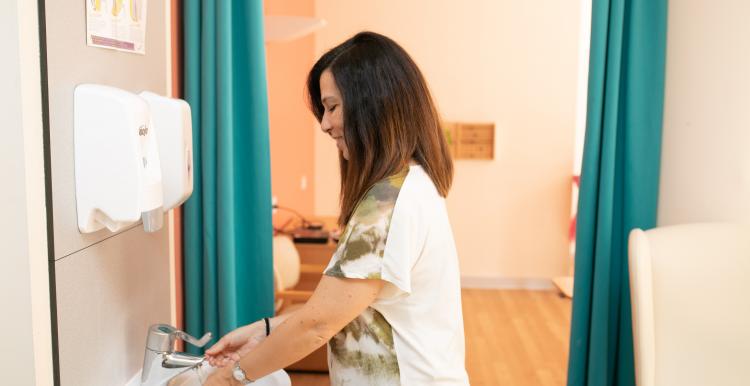Information on Coronavirus

Last updated: 16/07/2021
To check the latest Government guidance, please visit: https://www.gov.uk/coronavirus
Rutland Update
Find all the local information on the Rutland County Counicl website:
Find more local information on Coronavirus
If you have symptoms of coronavirus, please self-isolate and get tested as soon as you can. Find out how to book a test in Rutland.
If you think you might have coronavirus
Symptoms
-
A high temperature
- A new, continuous cough
-
Loss or change in sense of smell or taste
Most people with symptoms have at least one of these.
Many people with COVID-19 do not have symptoms but can still infect others. This is why everyone is advised to get tested regularly.
Find out about regular rapid COVID-19 tests
Read local guidance about asymptomatic testing
What to do if you have these symptoms
- Get a PCR test to check if you have COVID-19
- You and anyone you live with should stay at home and not have visitors until you get your test result.
Find out more and order a PCR test
If you have problems using the online service, call 119.
Get help from NHS 111 if:
- You are worried about your symptoms
- You are not sure what to do
If you do not have internet access, call NHS 111. For a medical emergency dial 999.
For people who are deaf or hard of hearing, the NHS 111 British Sign Language service is available here: https://interpreternow.co.uk/nhs111 or by calling 18001 111 on a textphone.
Read the NHS advice about coronavirus
How to self-isolate if you or someone in your house has coronavirus
Stay at home and self-isolate.
- Do not go to work, school, or public areas
- Do not use public transport or taxis
-
Do not go out to get food and medicine – order it online or by phone, or ask someone to bring it to your home
-
Do not have visitors in your home, including friends and family – except for people providing essential care
-
Do not go out to exercise – exercise at home or in your garden, if you have one
Your isolation period includes the day the first person in your household’s symptoms started (or the day their test was taken if they did not have symptoms, whether this was an LFD or PCR test), and the next 10 full days.
For more information about when to self isolate and what this means for families visit the NHS website.
In England from 16 August, if you’re fully vaccinated or under 18, you will not need to self-isolate following close contact with someone who has COVID-19. You’ll still need to take a PCR test and self-isolate if it’s positive.
Coronavirus Information Service on WhatsApp
The Government has made a free to use service is an automated ‘chatbot’, allowing people to get answers to the most common questions about coronavirus direct from the Government.
How to avoid catching or spreading germs
Do:
- Cover your mouth and nose with a tissue or your sleeve (not your hands) when you cough or sneeze.
- Put used tissues in the bin straight away.
- Wash your hands with soap and water often, and for 20 seconds – use hand sanitiser gel if soap and water are not available.
- Try to avoid close contact with people who are unwell.
Don't:
-
Do not touch your eyes, nose or mouth if your hands are not clean.
Watch NHS England's video on how to wash your hands properly
Hand Hygiene Advice in alternative formats (Easy Read, BSL, Large print, Audio)
Face masks - when to wear one
The legal requirement to wear a face mask in all settings has now ended. However, people may wish to continue wearing them, and that personal decision should be respected.
The Government expects and recommends that people wear face coverings in crowded areas and some businesses and travel operators can even make wearing a face mask compulsory for customers and passengers.
Getting tested for Coronavirus (COVID-19)
Guidance on coronavirus testing, including who is eligible for a test, how to get tested and the different types of tests, is available on the Government's website.
Read Healthwatch England's information about different tests
Further information
NHS England has produced a list of common questions about coronavirus, covering advice for you and your family, how it's caught and spread, prevention, self-isolation, testing and treatment and foreign travel.
NHS coronavirus common questions
Find out more about the NHS COVID-19 app
Other places for information:
Easy Read and other language/format information about coronavirus and self-isolation
Find COVID-19 Infographics in different languages
Alternative formats of Public Health England national messaging, including BSL, large print, easy read, and audio/radio versions.
Translations of Public Health England national messaging.
Easy Read information about coronavirus and self-isolation
NHS guidance - Coronavirus – Easy Read and Large Print, Getting NHS help when you need it during the coronavirus outbreak - Easy Read, Getting NHS help when you need it during the coronavirus outbreak - plain English
Mencap - Information about Coronavirus (COVID-19)
Gov.uk - Advice to staff supporting people with a learning disability or autistic people
Easy Read Online - Guide include Easy Read advice about Coronavirus and self-isolating, Coronavirus Glossary - a list of those words and what they mean


